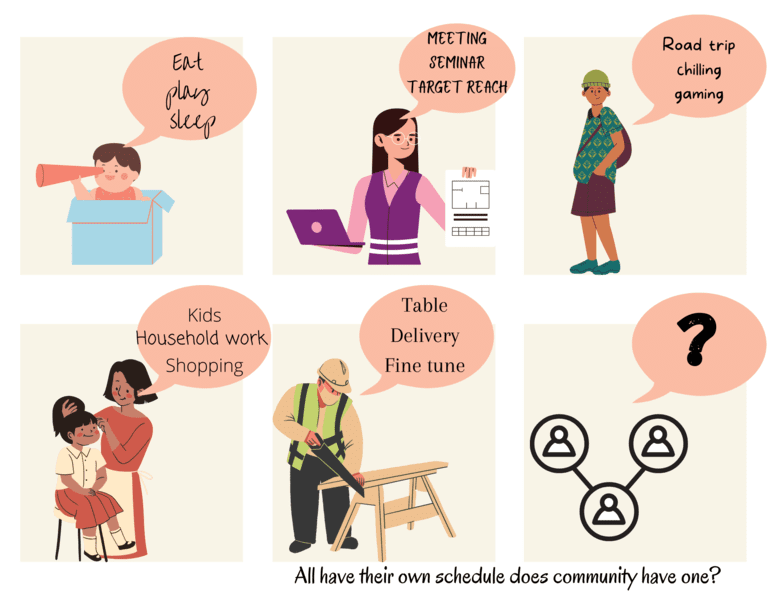Community and Cold Coffee 🥤😎|Ep- 7: Can a community be scheduled?
What is a schedule? The dictionary defines it as a plan for carrying out a process or a procedure, giving a list of intended events and times.
Does this phrase make sense in a community? A community revolves around people and their emotions.

Have a look at these two sets of questions set 1: Can you tell the waves when and how to move? Will it even look good? Doing that will ruin the beauty of it, right?
Set 2: Can you schedule human emotions? Can humans be scheduled like robots? Can a community be scheduled? How important is a content calendar for your community? Do you think the content has to be spontaneous? How does ritual fit into the content calendar? Why or why does scheduling not make sense? What should be scheduled?
Both sets of questions talk about predicting something unpredictable. We’re not sure about the first set of questions, but this week’s C3 was sure to find answers for the second set of questions cause anyone related to the community must get this right.
And that’s why people who love community gathered together to explore everything that could answer the second set of questions. The panel had,
Sneha Sundaram - Founder, Kutuki
Rahul Ranjan - Manager (YouTube Growth) at Unacademy
Cherish Santoshi - Founding Member, Head of Community, SAWO Labs
Abilash K B - Technical Writer
Parul Gupta - Lead Content & Digital Marketing | Advocate of Community Building, Vayavya Labs
Rochelle Carvalho - Digital Marketing Manager, West Pharmaceutical Services
With all of them lined up, the first question set the atmosphere for the session.
Do you think a community can be scheduled? If yes, where?
The panelists in unison agreed that yes, a community could be scheduled, and these are the areas where they can
1. Content calendar
2. Rituals
Having agreed to the concept, the chat began looking at how it might resonate with a community in every aspect. Everyone had significant inputs in this area and those are compiled for you below.
Parul: Communities can be scheduled for things that don't involve interaction, such as a release note.
Rahul: We can, and yes, we should schedule in a community, but only ordinary things. When we do so, we get time to organize the other items in a community.
Deepak: Scheduling is helpful if you want consistency, but you are never forced to have one. It’s more of a spontaneous expression that works out in a community.
Cherish: A community exists because of people. If you happen to have a schedule and people start showing interest in something not in your schedule, chuck it and do what the people want because they are the heroes.
Varu: I don’t schedule content, but I schedule the push notification based on the availability of community members. (Based on the most active member time in the community)
With all these thoughts amazing us and taking us into thoughts as to how we can use this in our community, That’s when Sneha put up a very relevant question for any community builder in their initial times.
What to do in the initial stage? How much is too little? How much is too much?
For which the panelist gave out ideas and tips that would help their ways in community building.
Cherish: There is a usual engagement metric ratio that a community would get, like 90:9:1 or 60:30:1; each community has its ratio.
Finding out the ratio of your community and setting benchmarks is an intelligent thing to do.
Make a content strategy
Create content buckets
Analytics and data can give a lot to the community in the beginning.
Note: You just need to keep putting in all your efforts in a community, and over time you will know what works out in your community.
Varu: You need to post content that will set the tone and culture for the community, see the comments and feature the positive ones. This will encourage them to contribute more. Repeat this whole cycle for a while. This will act as a warm-up for the members of your community.
Rochelle: Drive content that is appreciated and use polls cause polls are easy to make people in the community interact.
Deepak: Small baby steps will help people to open up in a community. That is why the first set of people are vital. Cause they are the ones who set the tone and culture of the community and the host just has to go along with them because, in the end, a community is for the people.
Moving forward, It’s inevitable to not have a question after hearing all these tips, and that’s when Abhinash and Sneha queried, asking if things don’t work out, should we create content targeted to a specific set of people in the community itself, can that be a practice? And how long does all this take?
The others immediately put their hands out to give possible ways that would solve those issues, saying.
It takes too long, and you can’t skip that step.
Moderators and hosts have to take the initiative and set days for certain types of content and follow the practice for some time for the others to resonate and follow the pattern.
Appreciate and encourage people to use tags, and this could cut off the clutter in the community.
There is no community for all; all communities are different in their way, making each community special. So the only way to figure this out is to experiment, look at the result resonated, and then set rituals.
Experimenting will also help you figure out the active members who can be your inner circle. Interacting with the inner circle will tell you what the people in the community like and want.
Meeting in a community does make all this process easy, and that is where events come into the picture
Things to remember
You should not choose your inner circle but identify people who could be your inner circle and give attention to them.
Content writers in the community should not be salesy
GTM- captures value & CTC- creates value
Moderators should help new members at the beginning to understand the tone of the community.
Conclusion
Scheduling is essential, but at the same time, spontaneity is even more critical. Knowing where to use what will take your community a long way.


 Habitate
Habitate